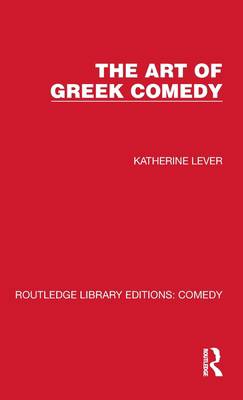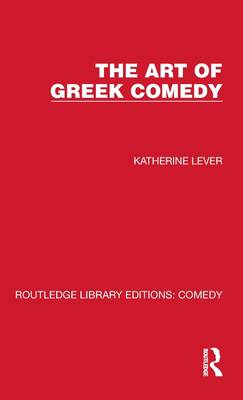
- Afhalen na 1 uur in een winkel met voorraad
- Gratis thuislevering in België vanaf € 30
- Ruim aanbod met 7 miljoen producten
- Afhalen na 1 uur in een winkel met voorraad
- Gratis thuislevering in België vanaf € 30
- Ruim aanbod met 7 miljoen producten
Omschrijving
Originally published in 1956, this is a critical analysis of the comedies of Aristophanes and Menander studied in the context of the history of comedy, of the allied arts, and of contemporary life.
Aristophanes and Menander are deservedly the most famous writers of Greek comedy. The extant comedies of Aristophanes are notable for wit, comical action, beautiful poetry, and the dramatization of such problems as health of mind and body, sex, money, government, law, religion, education, and drama, music and poetry. Menander portrays with delicate and sympathetic understanding a world in which the seeming evils of loss and discord eventually lead to the genuine goods of discovery and concord. The art of Aristophanes is critically examined in three chapters and that of Menander in one.
For centuries Dionysos had been worshipped in a spirit of ecstasy which manifested itself in song, dance and the wearing of masks and costumes, pantomime, farce, and satire. The processes by which these diverse elements were developed and fused into the complex literary form of Old Comedy are the subject of the first three chapters.
Aristophanes was not only pre-eminent as a writer of Old Comedy; he also participated in the transformation of Old Comedy into Middle Comedy, a curious and interesting dramatic form which is fully treated in the seventh chapter. In the last chapter the emergence of New Comedy is traced and the art of Menander criticized. The book ends with a brief indication of the various forms in which the spirit of Greek comedy had survived to the present day.
Specificaties
Betrokkenen
- Auteur(s):
- Uitgeverij:
Inhoud
- Aantal bladzijden:
- 222
- Taal:
- Engels
- Reeks:
Eigenschappen
- Productcode (EAN):
- 9781032225784
- Verschijningsdatum:
- 27/04/2022
- Uitvoering:
- Hardcover
- Formaat:
- Genaaid
- Afmetingen:
- 140 mm x 216 mm
- Gewicht:
- 412 g

Alleen bij Standaard Boekhandel
Beoordelingen
We publiceren alleen reviews die voldoen aan de voorwaarden voor reviews. Bekijk onze voorwaarden voor reviews.











